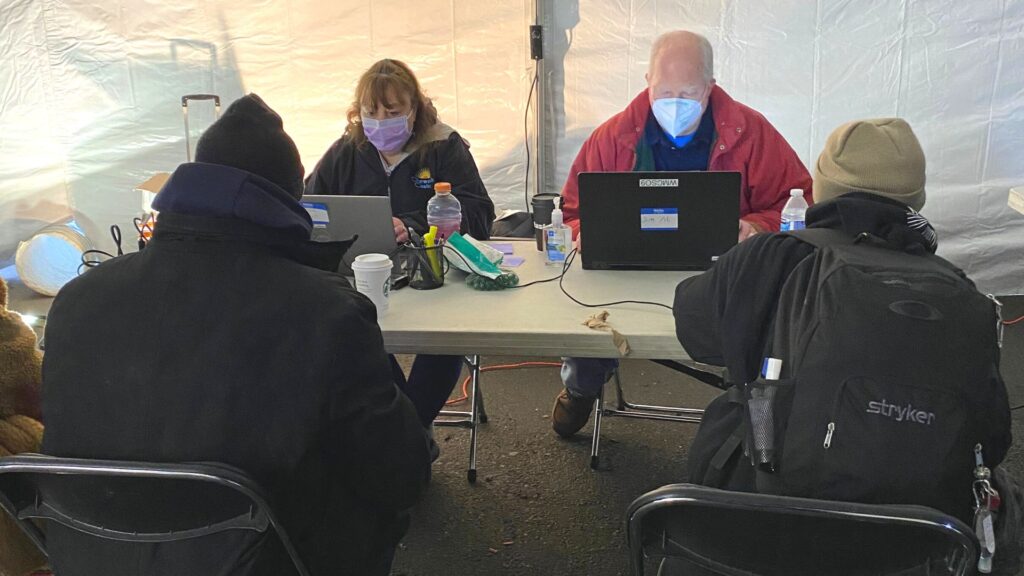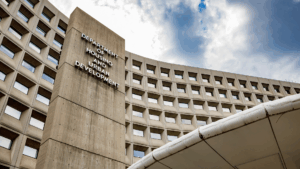Our joint Services and Benefits fair, located in Seattle’s Chinatown International District (CID), was a huge success, providing more people with essential identification documents onsite and connecting more people to support services.
- The state Department of Licensing issued 72 Washington State IDs onsite.
- The state Department of Social and Health Services connected 87 people to food, economic and/or medical assistance.
- The state Department of Health staff printed 12 Washington State birth certificates onsite.
- Catholic Community Services printed more than 20 Homeless Management Information Services (HMIS) IDs which can be used as documentation on government forms.
- Outreach providers including KCRHA Systems Advocates, REACH, PDA (CoLEAD), and the City of Seattle’s HOPE Team were onsite to facilitate service matching
Identification Documents are Essential for Housing
For two months, KCRHA Systems Advocate (SA) Shannon Tucker spent significant time and effort trying to gather the necessary information so one of her unhoused clients could obtain identification. But there were some real challenges to overcome. The last time he was issued an ID was in 1996. While his information was on file with the DMV, his photo was not. He needed to produce other vital documents, such as a birth certificate. He didn’t have one, and an ID is one of the documents used to get a birth certificate. It’s the type of obstacle that regularly affects our unhoused neighbors. Her client had been homeless since he was a teenager, eliminating the option to use a yearbook photo to prove his identity. He also didn’t know his social security number.
“I was frustrated,” Shannon said. But she didn’t give up. Her client was patient as they navigated the obstacles. This included spending hours at various agency offices waiting for positive news.
The situation changed on Tuesday at a joint services and benefits event for people experiencing homelessness in the Chinatown International District. KCRHA partnered with three state agencies: the Department of Licensing (DOL), the Department of Health (DOH), and the Department of Social and Health Services (DSHS). Onsite staff connected people with social services such as SNAP (food) benefits, identification cards, and birth certificates. They were prepared to handle the particular barriers that an unhoused person faces in keeping track of documents such as a social security card. And they understand that identification is the key to accessing housing, employment, and other services.
DOL staff worked through Shannon’s client challenges on Tuesday, and he is now receiving his photo identification card.
“I had tears in my eyes. I was so happy,” Shannon shared. “My client started smiling.”
Collaboration is Key
This outcome reinforces the positive impacts of collaboration and innovation in removing barriers on the path to housing. In addition to the state agencies, PDA (also known as CoLEAD or JustCARE), REACH, Catholic Community Services (CCS), the City of Seattle’s HOPE team, and KCRHA Systems Advocates also participated. They connected people with supplies, services, and housing matches. The event was a huge success.
Shannon’s client is one of dozens of people who are now one step closer to permanent housing because of this event. “The event was the true definition of meeting people where they’re at,” Shannon shared.
Making Progress
KCRHA has also hosted our first housing fair in the Chinatown International District (CID). We engaged with about 50 people living unsheltered, connecting them with the Systems Advocates team to increase housing matches and placements.
Snapshot of progress in Downtown and the CID so far:
- 167 individuals, couples, and families have moved inside, including permanent housing and interim options awaiting housing.
- 72 people have signed 12-month leases in permanent housing (both private market and permanent supportive housing).
- 214 people are on the path to housing at three prioritized sites in Downtown and the CID
- 293 people on the By-Name List have received the identification documents that are required for housing, jobs, and social service benefits
In addition, we’re happy to report that the latest data from HMIS shows that 5,600+ individuals, couples, and families moved out of homelessness and into permanent housing in 2022. That includes 1,600+ thanks to three new programs: the State Right-of-Way Initiative, Emergency Housing Vouchers, and Partnership for Zero.
KCRHA and our partners continue to refine and improve our efforts, with collaboration and evidence-based approaches to resolving encampments. We’re making progress each and every day.



